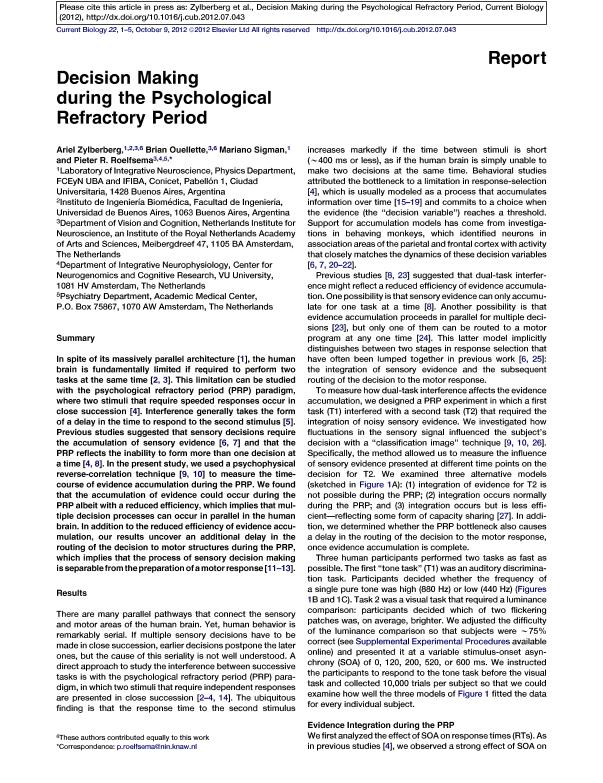Mostrar el registro sencillo del ítem
dc.contributor.author
Zylberberg, Ariel Dario

dc.contributor.author
Ouellette, Brian
dc.contributor.author
Sigman, Mariano

dc.contributor.author
Roelfsema, Pieter R.
dc.date.available
2018-08-17T15:39:02Z
dc.date.issued
2012-10
dc.identifier.citation
Zylberberg, Ariel Dario; Ouellette, Brian; Sigman, Mariano; Roelfsema, Pieter R.; Decision making during the psychological refractory period; Cell Press; Current Biology; 22; 19; 10-2012; 1795-1799
dc.identifier.issn
0960-9822
dc.identifier.uri
http://hdl.handle.net/11336/56117
dc.description.abstract
In spite of its massively parallel architecture [1], the human brain is fundamentally limited if required to perform two tasks at the same time [2, 3]. This limitation can be studied with the psychological refractory period (PRP) paradigm, where two stimuli that require speeded responses occur in close succession [4]. Interference generally takes the form of a delay in the time to respond to the second stimulus [5]. Previous studies suggested that sensory decisions require the accumulation of sensory evidence [6, 7] and that the PRP reflects the inability to form more than one decision at a time [4, 8]. In the present study, we used a psychophysical reverse-correlation technique [9, 10] to measure the time-course of evidence accumulation during the PRP. We found that the accumulation of evidence could occur during the PRP albeit with a reduced efficiency, which implies that multiple decision processes can occur in parallel in the human brain. In addition to the reduced efficiency of evidence accumulation, our results uncover an additional delay in the routing of the decision to motor structures during the PRP, which implies that the process of sensory decision making is separable from the preparation of a motor response [11-13]. © 2012 Elsevier Ltd. All rights reserved.
dc.format
application/pdf
dc.language.iso
eng
dc.publisher
Cell Press

dc.rights
info:eu-repo/semantics/openAccess
dc.rights.uri
https://creativecommons.org/licenses/by-nc-sa/2.5/ar/
dc.subject
Decision Making
dc.subject
Psycological Refractory Period
dc.subject.classification
Otras Ciencias Biológicas

dc.subject.classification
Ciencias Biológicas

dc.subject.classification
CIENCIAS NATURALES Y EXACTAS

dc.title
Decision making during the psychological refractory period
dc.type
info:eu-repo/semantics/article
dc.type
info:ar-repo/semantics/artículo
dc.type
info:eu-repo/semantics/publishedVersion
dc.date.updated
2018-08-13T18:29:39Z
dc.journal.volume
22
dc.journal.number
19
dc.journal.pagination
1795-1799
dc.journal.pais
Estados Unidos

dc.journal.ciudad
Nueva York
dc.description.fil
Fil: Zylberberg, Ariel Dario. Universidad de Buenos Aires. Facultad de Ciencias Exactas y Naturales. Departamento de Física. Laboratorio de Neurociencia Integrativa; Argentina. Consejo Nacional de Investigaciones Científicas y Técnicas. Oficina de Coordinación Administrativa Ciudad Universitaria. Instituto de Física de Buenos Aires. Universidad de Buenos Aires. Facultad de Ciencias Exactas y Naturales. Instituto de Física de Buenos Aires; Argentina
dc.description.fil
Fil: Ouellette, Brian. Netherlands Institute For Neuroscience; Países Bajos
dc.description.fil
Fil: Sigman, Mariano. Universidad de Buenos Aires. Facultad de Ciencias Exactas y Naturales. Departamento de Física. Laboratorio de Neurociencia Integrativa; Argentina. Consejo Nacional de Investigaciones Científicas y Técnicas. Oficina de Coordinación Administrativa Ciudad Universitaria. Instituto de Física de Buenos Aires. Universidad de Buenos Aires. Facultad de Ciencias Exactas y Naturales. Instituto de Física de Buenos Aires; Argentina
dc.description.fil
Fil: Roelfsema, Pieter R.. Netherlands Institute For Neuroscience; Países Bajos
dc.journal.title
Current Biology

dc.relation.alternativeid
info:eu-repo/semantics/altIdentifier/doi/http://dx.doi.org/10.1016/j.cub.2012.07.043
Archivos asociados
